Iran Gives Military Drones To Every Country 'That Needs Them'
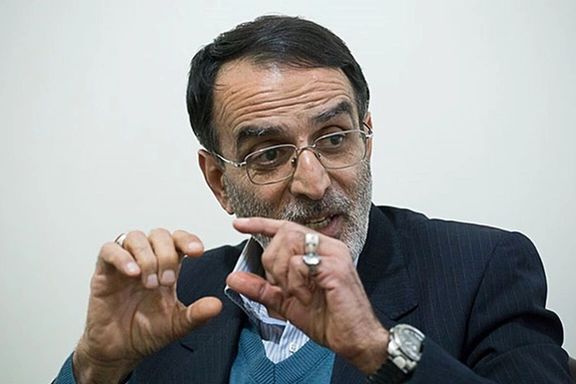
An Iranian lawmaker says the Islamic Republic gives drones to Iraq and other countries to help them provide for their own security and the security of the region.

An Iranian lawmaker says the Islamic Republic gives drones to Iraq and other countries to help them provide for their own security and the security of the region.

Hassan Rouhani, the only Iranian president who has ever spoken to a US president, says he had a chance to talk with Donald Trump when he was in New York in 2019.
Rouhani talked with US President Barack Obama over the phone in September 2013. Obama initiated the call when the Iranian president was on his way to the airport to fly back to Iran after attending the UN General Assembly meeting.
Aftab News website in Iran on September 4, quoted one of the three authors of a book about Rouhani's presidency as saying that "although tensions between Tehran and Washington rose to an unprecedented high level during Donald Trump's Presidency, Rouhani was only one step short of meeting with Trump in 2019."
The meeting, which was well publicized at the time, did not take place, but Rouhani has spoken about the chance to shake hands with Trump in a recent meeting with a circle of insiders including the three authors of "A War with No Fire or Smoke" Behran Mehrju, Vali Khalili and Arash Pourebrahimi. However, Aftab News did not reveal which of the trio disclosed Rouhani's remarks.
"If Obama was in office as US President rather than Trump, I would have definitely gone to meet with him," the author quoted Rouhani. The remark reminded the author of a statement made by Rouhani in 2013 before becoming Iran's President. Rouhani had said pointing at his chest: "My heart is full of secrets, but I will speak only when someone challenges and provokes me."
Three chances for peace
Rouhani said that Iran had three chances to make peace with America and end the US sanctions. "In the first occasion Europeans led by French President Emmanuel Macron tried to mediate between Tehran and Washington. The second occasion was former Japanese Prime Minister,” who took the lead as mediator. And the third one came up during his visit to New York in September 2019.
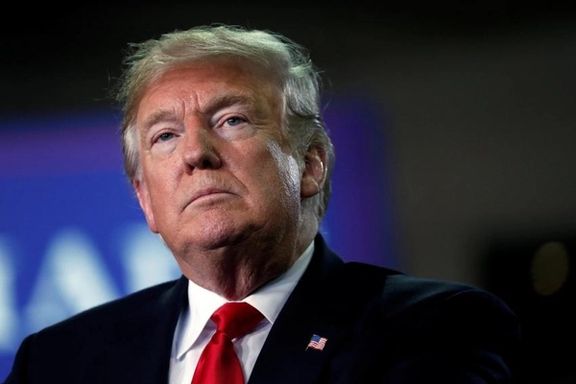
"The P5+1 members also came there. Former German Chancellor Angela Merkle who rarely went to New York also showed up. UK Prime Minister Boris Johnson also came although he was in the middle of a domestic political tempest. Russia and China's foreign ministers also extended their visit to New York. Mediators were trying to solve the problems between Iran and America, and everything was prepared for direct talks."
Who takes credit?
But there was a problem. Rouhani recalled: "Trump insisted that he should break out the news about the meeting. But I knew he was an actor. He was not an ordinary man. He was acting all the time. A good actor. I was worried that he might announce the meeting and then disrupt the game."
Rouhani was even ready to take part in the meeting on the condition that the news of the meeting would be released while the meeting was taking place. "But at the last minute, we decided that there was no chance for an honest dialogue with Trump on equal footing. And others knew about it."
What about Khamenei?
Rouhani’s account of the events in 2019 should be considered from another angel. No one knows for sure whether Rouhani contacted Supreme Leader Ali Khamenei in the meantime, but based on previous experience, Khamenei most likely intervened at the last moment and cancelled the meeting. Knowing Khamenei and Rouhani, it is unconceivable to think that Rouhani would have met Trump without first seeking Khamenei's permission.
At the same time in Tehran, -then- government spokesman Ali Rabiei said Rouhani was not slated to meet with Trump and that no conditions have been set for such a meeting. "There is no reason for a meeting between Rouhani and an economic terrorist," said Rabiei.
Nonetheless, later in October Rouhani blamed Trump for the failure of the talks in which he said Macron was also slated to take part. He was probably referring to the fact that Trump imposed a new set of sanctions on Iran on 24 September 2019 after he realized that a meeting with Rouhani was not going to take place.
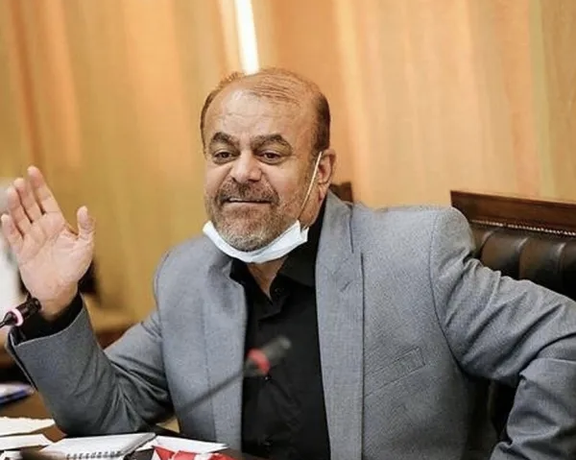
A lawmaker suggested Iran’s roads minister is hospitalized to evade accountability in a corruption case involving his adviser, a relative of an influential ayatollah close to the Supreme Leader.
In a thread of tweets on Friday, Ardeshir Motahari, a lawmaker accused Rostam Ghasemi, the minister of roads and urban development, of taking advantage of his hospitalization as an excuse not to provide any response regarding the arrest of his adviser by intelligence ministry’s agents "exactly on the date he arranged to receive a bribe in euros."
Ghasem Makarem Shirazi, the adviser, is the grandson or nephew of – according to different reports – of Grand Ayatollah Naser Makarem Shirazi, a well-known hardliner Shiite leader who is a close ally and staunch supporter of Ali Khamenei. In the latest parliamentary election, the accused ran for office from the city of Shiraz but failed to garner enough votes. He has held several positions during his career and has always been close to Ghasemi.

"Since the arrest of his advisor and special inspector, instead of answering questions, he has been lying on the bed,” Motahari said.
He also implicitly accused the road minister’s son of collaborating with his father’s detained adviser, and mentioned some other names and a corruption case about a land grab in the district of Boumehen (Bumehen) west of the capital Tehran.
Last week, the administration of Ebrahim Raisi confirmed reports about Makarem Shirazi’s arrest, but said the minister is in hospital for a spinal surgery.
Relatives of top figures in the Islamic Republic are often appointed to jobs unrelated to their education and expertise and many of them take advantage of their connections to circumvent regulations to make profit or receive bribes.
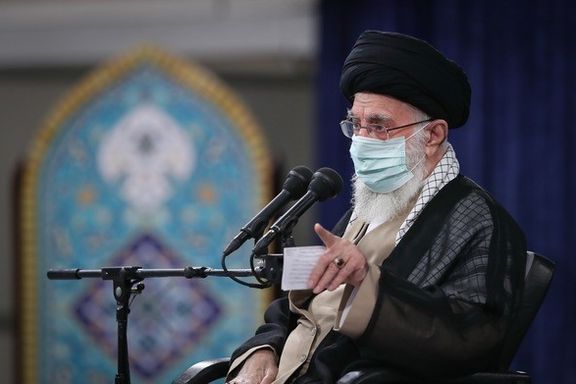
Iran's Supreme Leader has repeated accusations that the United States and other Western powers pit Muslims against each other to create conflict among them.
In an address to the 7th Summit of Ahlul Bayt, a religious organization of his own creation, in Tehran on Saturday, Khamenei accused Western powers, which he usually refers to as ‘arrogant powers’, of trying to sow discord in the Muslim world. The aging cleric said the “Great Satan”, the United States, orchestrates plans for war and conflict between Shia and Sunni Muslims, Arabs and non-Arabs, among Shias, and among Sunnis.
In his speech Khamenei also claimed that the Islamic Republic is not biased in matters such as the differences between the Shia and Sunni and Arab and non-Arab and seeks the unity of all Islamic countries.
Sunnis in the region would take issue with Khamenei’s claim, as they Iran creates and arms Shiite militant groups in Iraq, Yemen, Syria and Lebanon to expand its power and influence.
Iran’s ruler said Shia Muslims take great pride in standing up against “the seven headed monster of arrogance” (Western world powers), and defeating their plans, adding that they “interfere in the affairs of other countries, governments, and nations in a cruel and tyrannical manner.”
However, Khamenei did not comment on ongoing nuclear talks with the US. He has been silent on the topic for the past few months as negotiations have continued and reached a sensitive stage.

The Islamic Republic from its inception in 1979 has been led by anti-Western clerics, somewhat supported by leftist and pro-Russian political elements, who in the very first year took dozens of US embassy staff hostage for 444 days. Khamenei has faithfully continued this policy calling for the demise of Israel, the United States and Western Europe.
Iran’s encouragement of other nations “to stand up against world powers’ bullying” is the main reason for tensions with the Islamic Republic. “Neutralizing the criminal plots of the United States in other countries, of which the creation of Daesh (ISIS) is an example, has triggered an intense Iranophobia and Shiaphobia campaigns and accusations that Iran meddles in the affairs of other nations,” he said while denying any such interference by the Islamic Republic.
Describing the flag of the Islamic Republic as the “same flag as the flag of Ahl-ul-Bayt and prophets”, Khamenei also told the participants that the Islamic Republic has “hoisted the banner of justice and spirituality” and is the standard bearer in the war against “arrogance and dominion [of Western powers]”.
The website of Ahlul Bayt World Assembly which was founded in 1990 by Khameneiclaims it is “an international non-governmental organization (NGO)” established by “a group of Shiite elites under the supervision of the great Islamic authority of the Shiites in 1990” to identify, organize, educate and support the followers of Ahlul Bayt (those who believe in Prophet Muhammed and his household). “It is natural that the arrogant powers will oppose such a system,” he said.
Like several other entities often referred to as nongovernmental organizations and charities which are under Khamenei’s supervision and control, the Assembly is generally known as a propaganda arm of the regime and supporter of militant groups in the region, for its anti-Israeli campaigns, as well as activities aimed at exporting Iran’s Islamic revolution.
The summit of the assembly is being held in Tehran and northeastern religious city of Mashhad. According to the event’s organizers. Guests from more than 110 countries have attended the summit.
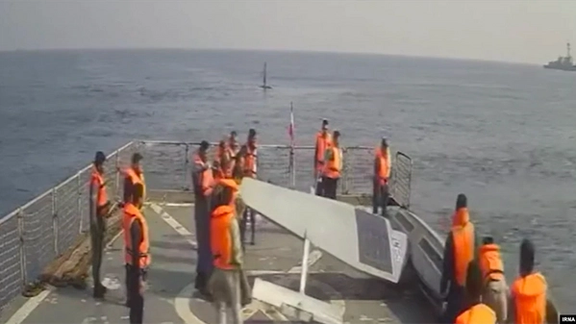
A new report says Iran has removed the cameras from two American sea drones it seized and released in the Red Sea on Friday.
The Wall Street Journal quoted an unnamed US official as saying Friday afternoon that Iran returned the two captured maritime drones after being confronted by US destroyers but the unmanned vessels were missing their cameras.
The official, however, claimed that it was not clear if the Iranians kept the cameras or if they fell off when the Iranian navy ship hauled the drones out of the water and later put them back, implying that the cameras on both drones could have fallen off accidentally. The unmanned drones are designed to stay in all weather condition in the sea.
US officials have said that the cameras, radars, sensors and other equipment for navigation and data collection on the drones are commercially available and the technology does not store sensitive or classified information. But retaining the cameras and inspecting the drones up close could give Iran a better idea of the system’s capabilities, which is part of the US advanced aerial and maritime sensors in the region, known as Task Force 59, designed to use artificial intelligence to monitor Iran’s activities at sea.
The disclosure about the cameras is the latest twist in the story of encounters between Iranian and US naval forces this week.
On Tuesday, the US Naval Forces Central Command said that the US Navy prevented a support ship from Iran’s Revolutionary Guard’s Navy -- named Shahid Baziar -- from capturing an unmanned vessel operated by the US 5th Fleet in the Persian Gulf.
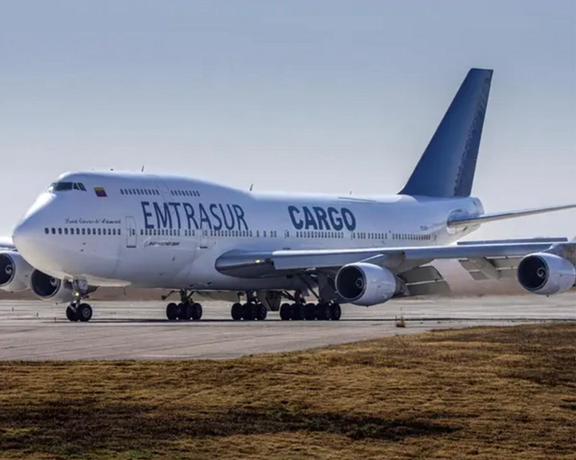
In an interview the Iranian pilot of a Venezuelan cargo plane grounded in Argentina three months ago has denied any ties to Iran’s Revolutionary Guards (IRGC).
In the interview with Al Mayadeen Espanol published Friday, Captain Gholamreza Ghasemi reiterated the claim that he is a flight instructor and had no ties to the Iranian military except for fighting in the Iran-Iraq War (1980-1988) as a volunteer in the Basij Popular Mobilization Forces.
The crew of the plane have been held in Buenos Aires since early June over suspected connections with Iran's Revolutionary Guard’s Quds Force and links to international terrorism.
Gerardo Milman, an Argentine lawmaker, told Iran International in June that Iranians aboard the Venezuelan plane planned “attacks on human targets.” Milman also alleged that Captain Ghasemi was a senior official of Qods (Quds) force.
Ghasemi told Al Mayadeen, a network close to the Islamic Republic, he had informed the Argentinian authorities before their arrival in Buenos Aires on June 8 that there were two Venezuelans onboard theBoeing 747 who were undergoing training by him.
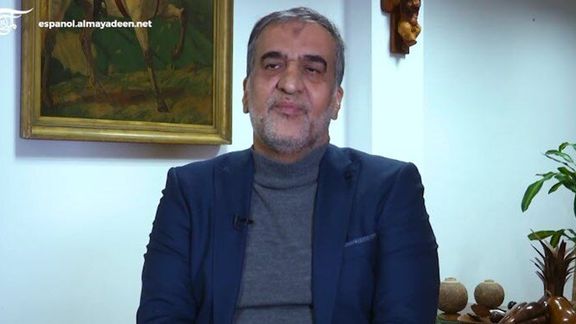
According to Ghasemi, everything appeared normal when the plane entered Argentina and unloaded its cargo and took off for Paraguay. Apparently after returning to Buenos Aires following Paraguay’s denial of entry -- Argentinian authorities said they would not supply fuel to the plane when it wanted to leave. “If we had been supplied with fuel, we would have left the country, and nothing would have happened.”
“Since that day, there have been a series of issues that the Argentinians have been using as pretexts to justify their action,” he added.
The plane had to return to Argentina when Uruguay refused to allow it to land. “I have never witnessed a case anywhere in the world where a country grants permission for planes to fly in its airspace and an entry permit, and suddenly cancels them in the middle of a flight. This is the first time I've seen something like this in 20 years,” Ghasemi said.
Head of the Paraguayan National Intelligence Secretariat Esteban Aquino told the country’s Spanish language digital newspaper ABC Digital on June 18 that Ghasemi had ties with the IRGC despite claims by Argentina that no evidence linked the case to the Revolutionary Guards’ Qods Force.
Ghasemi also said that many Argentine officials have said in interviews that there is no pending case against the flight crew and that they can leave Argentina but that “the law should be respected” so they are waiting for the court and the judicial authorities’ decision on the matter.
The US Justice Department said August 2 that it was seeking possession of the cargo jet because it was previously owned by Iran’s Mahan Air that allegedly has ties to terror groups.
Iran has denied that the Boeing 747 belongs to Mahan Airlines, sanctioned by the US in 2008 for links to the Qods Force, the IRGC’s extraterritorial intelligence and secret ops outfit, which has been listed as a terrorist organization by the United States.
Early in 2022, Venezuela’s Conviasa decided to set up a cargo division that came to be called Emtrasur Cargo and its first plane was the Boeing 747-300M bought or leased from Mahan airlines and christened ‘Louisa Caceres Arismendi.’
The Israeli embassy in Buenos Aires also released a statement on June 17, saying that the Boeing 747 was used by the Iranian company Mahan Air and transported “a group of Iranian officials, including a senior executive of the airline Qeshm Fars Air,” accused of transporting weapons for Hezbollah during the civil war in Syria.
Mohammad Javad Karimi Ghoddusi (Qoddusi), a member of the Iranian parliament's National Security and Foreign Policy Committee, said on Sunday that Iran “generously” provides drones to every country that needs them “according to the strategy of Islam and in line with maintaining the region’s security.”
He said the country’s drone industry and all its costs are justifiable for Iran’s defense system because it has not prioritized the strategy of expensive and complex aircraft.
Claiming that “the Americans admit their air supremacy in the world has been challenged by Iran,” he said that “the combination of Iran’s missiles and drones' capabilities has created a very extensive, deep, precise and low-cost security for the entire Islamic nation and Islamic countries.” They pay for the drones and Iran’s aid is not free, he added.
Last week, a member of the Ukrainian parliament, Yuliya Leonidivna Klymenko, told Iran International that she was “deeply shocked and saddened" by the fact that Iran sent drones to Russia to be used in its invasion of Ukraine, noting that Moscow is going to buy 100 more drones from Iran in addition to the drones it recently bought from the Islamic Republic.
US Defense Department spokesperson Todd Breasseale said on Tuesday, August 30, that Russia has faced "numerous failures" with Iranian-made drones acquired from Tehran this month, adding that the United States assesses Russia has received the delivery of Mohajer-6 and Shahed-series unmanned aerial vehicles (UAVs) over several days this month.